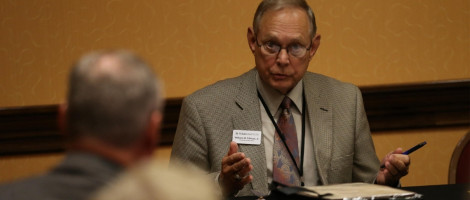The pursuit of freedom has long been a driving force for Baptists, according to a panel discussion on Monday morning led by Dr. Stacey Conner, Bill Tillman and Steve Vernon. "Baptist Freedom – Model for the 21st Century" was one of multiple workshops held at Texas Baptists Annual Meeting. Dr. Conner serves as the pastor of First Baptist Church Muleshoe, and Tillman and Vernon both serve with Texas Baptists, as Director of Theological Education and Associate Executive Director, respectively.
Vernon began the discussion by laying out the history regarding the Baptists' pursuit of freedom through the years.
He explained that "Baptists are people of freedom" and have been driven to seek freedom throughout the course of their history, in attempts to dispel the myth that in order to be a Christian, one must walk "in-step" with a particular religious style. He explained this by listing well-known individuals, including politicians, public figures and celebrities who are Baptists, but who do not necessarily line up with each other in many ways.
Vernon asserted that Baptists love and seek freedom, and bring a certain style of "Baptistification" everywhere they are, which pervades all things. One of these elements of the Baptist style is diversity. Vernon went on to state the Christian church was born into oppression, and the desire for freedom has been prevalent all along, pointing back even to Galatians 5:1 to the root of freedom in the cross of Christ. Finally, Vernon concluded by mentioning some of the threats to this freedom, including fundamentalism on both side of the spectrum, as well as relativism, or the idea that we are so free that everything and anything goes.
Tillman proceeded to explain some practical implications of this pursuit of freedom by defining a "free church" and a "free state". He quoted George Truett in saying the Baptist church has served as an "unyielding protagonist of religious liberty" and went on to cite Emmanuel Carlson's list of traits necessary for religious freedom.
This list included things such as the ability to hold public worship, to set membership and clergy standards, to practice acts of service and charity, to engage in business enterprises relative to certain objectives, and so on. It is under these banners Tillman defined the free church.
He then defined a free state as people permanently occupying a fixed territory bound together by common habits, that has control of all things within its boundaries. Out of this context, Baptists came to be, according to Tillman, which is why freedom is such a pillar of the Baptist faith. He concluded by mentioning the fact that there is no such thing as a complete separation of church and state, simply because the same people are moving back and forth between both. This dichotomy is expressed even in the first amendment to the U.S. Constitution, which in itself creates a tension that "Baptists have historically stepped into."
Tillman closed by saying that in a world of tension and "civil religion," our culture is not dissimilar to the world in which Paul worked.
Finally, Conner concluded the discussion with some personal examples and a challenge for all those attending to lead well in their given areas of influence. Many people are more concerned with political fears, both real and perceive, than with holding on to the Gospel.
"Train up your people on what it is to be a Baptist and a Christian and then unify around a mission," Conner concluded. "Our job is to educate, communicate and lead."
Courtney Hackett served as a guest writer during Texas Baptists' Annual Meeting, and is a junior at Dallas Baptist University.
Strengthening a multiplying movement of churches to live out the Great Commandment and Great Commission in Texas and beyond.
The ministry of Texas Baptists is made possible by giving through the Texas Baptists Cooperative Program, Mary Hill Davis Offering® for Texas Missions, Texas Baptists Worldwide and Texas Baptist Missions Foundation. Thank you for your faithful and generous support.
Subscribe to receive stories like this one directly to your inbox.
We are more together.
